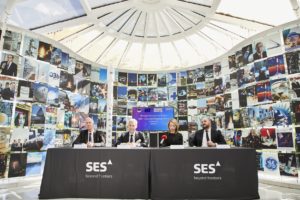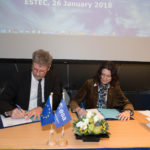The webinar, June 20 @ 10:30 am – 11:30 am CEST, is organised by EuroGeographics and European Global Navigation Satellite Systems Agency (GSA). The goal of the webinar is to brief users from mapping and GIS communities about EGNOS, the European free augmentation service that improves GPS accuracy up to sub-meter range for mapping and GIS applications. Read more…
Category Archives: Other
Orolia secures Galileo contract to supply clocks to 12 more satellites
Orolia announced that its atomic clock solutions have been selected for the Galileo Global Navigation Satellite System (GNSS). Under contracts totaling 26 million euros, Orolia will deliver its stable, accurate timing solutions to 12 additional Galileo satellites.
Each satellite will carry two Rubidium atomic clocks and two passive Hydrogen Masers, said to be the most stable clock in the world. Under these contracts, Orolia will supply its Spectratime Rubidium Atomic Frequency Standard and its Passive Hydrogen Masers physics package for an additional 12 Galileo satellites. These new satellites will reinforce Orolia’s position in the number of active atomic clocks in space, including more than 100 in the Galileo system. Read more…
SES provides managed services for Galileo
SES will provide a series of services for the Galileo European navigation system under a long-term agreement signed with Spaceopal, SES announced today.

Left to right: Ruy Pinto (SES CIO), André Bauerhin (Spaceopal COO), Nicole Robinson (SES Networks SVP Global Government) and Etienne Schneider (Luxembourg Deputy Prime Minister, Minister of the Economy)
The contract is part of the Galileo Service Operator (GSOp) framework agreement between Spaceopal – a joint venture between Telespazio and DLR GfR mbH – and the European Global Navigation Satellite System Agency (GSA). Read more…
EU legislation: Europe’s 2 satellite navigation systems moving forward
Summaries of EU legislation: The Summaries of EU legislation inform on the main aspects of the European legislation, policies and activities in a clear, easy-to-read and concise way. These Summaries are intended for a general, non-specialized audience.
This regulation lays down the rules for the European satellite navigation programmes Galileo and EGNOS.
Regulation (EU) No 1285/2013 of the European Parliament and of the Council of 11 December 2013 on the implementation and exploitation of European satellite navigation systems and repealing Council Regulation (EC) No 876/2002 and Regulation (EC) No 683/2008 of the European Parliament and of the Council Read more…
100 million users for Galileo navigation system
The Galileo satellite navigation system has about 100 million users after its first year of operation, as per the French Space Agency CNES.
The system, which is highly crucial to Europe, went operational in December 2016. It took 17 long years to be ready for launch. Initially the services it provided relayed a weak signal, and some of the timekeepers on the satellites did not function as two satellites were arrayed in the wrong orbit.
But, since then, additional satellites have been added, and by 2020 Galileo is supposed to offer enhanced accuracy than GPS, focusing on a location to within a meter, instead of several meters earlier. Read more…
The great opportunities of the Galileo satellite navigation system
Galileo is a state of the art navigation system with unique features not found in any other system.
Operational since 2016, it’s designed to offer free of charge commercial, mass market, governmental and search and rescue services. Read more…
New technology version of EGNOS will harness Galileo for aviation
The next generation of Europe’s satellite navigation overlay service, EGNOS, will combine use of GPS and Galileo signals to improve accuracy and robustness of navigation for air traffic and other uses where lives are at stake.
A contract was signed on 26th January at ESA’s technical centre in the Netherlands for the second generation of the European Geostationary Navigation Overlay Service, EGNOS V3, planned to enter service in 2025. Read more…


